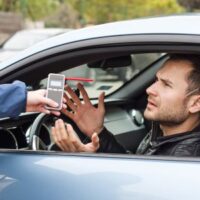What is the Difference Between a Preliminary and an Evidentiary Breath Test?

When it comes to being arrested for or charged with a DWAI or DUI in Colorado, it is critical to know that there are different types of breath tests — and you have not given implied or express consent for all types of tests. To be clear, you do actually have a right (without penalty) to decline breath tests in some circumstances, but not in others. The difference has to do with whether you are being asked to take a preliminary breath test or an evidentiary breath test. What is the difference between a preliminary breath test and an evidentiary breath test? Our Denver DUI defense lawyers can explain, and we are here to work with you on your defense if you are facing charges.
Preliminary Versus Evidentiary Breath Test
In Colorado, there are two types of breath tests that differ based on the timing of them: the preliminary breath test and the evidentiary breath test. A preliminary breath test is the breath test that a law enforcement officer might ask you to blow into when you have been stopped — but not arrested — on suspicion of a DWAI or DUI. At this point, prior to making an arrest, the law enforcement officer can only ask you to consent to this breath test. You have the ability to decline without penalty if you are at least 21 years old.
But if you agree to the preliminary breath test and the result shows a blood alcohol concentration above the legal limit, then the results of the test can be used against you to justify an arrest for a DWAI or DUI in Colorado. If your case proceeds to trial, the results of the preliminary breath test will not be introduced to the jury.
The evidentiary breath test, differently, is a breath test administered after you have been arrested. For an evidentiary breath test, you have already given consent simply by driving on the road. This test is supposedly more reliable and will be used as evidence against you in court or a trial.
Express Consent and the Evidentiary Breath Test in Colorado
What do we mean when we say you have given consent to an evidentiary breath test merely by deciding to drive? Under Colorado’s express consent law (often called implied consent in other states), by driving, you give consent to a breath test if you are arrested on suspicion of a DWAI, DUI, or other alcohol-related offense.
Refusing to take an evidentiary breath test can result in an immediate driver’s license suspension in addition to other potential penalties and consequences.
Contact a Denver DUI Defense Lawyer
Whether you have already consented to a preliminary breath test that resulted in your arrest, you need help after refusing an evidentiary breath test, or you simply need to begin working on a defense after being charged with a DWAI/DUI because of a breath test result, a lawyer can help. One of the experienced Denver DUI defense attorneys at DeChant Law can speak with you today about your options for defending against DWAI or DUI charges in Colorado. Contact us for assistance with your defense.
Source:
cdor.colorado.gov/express-consent
